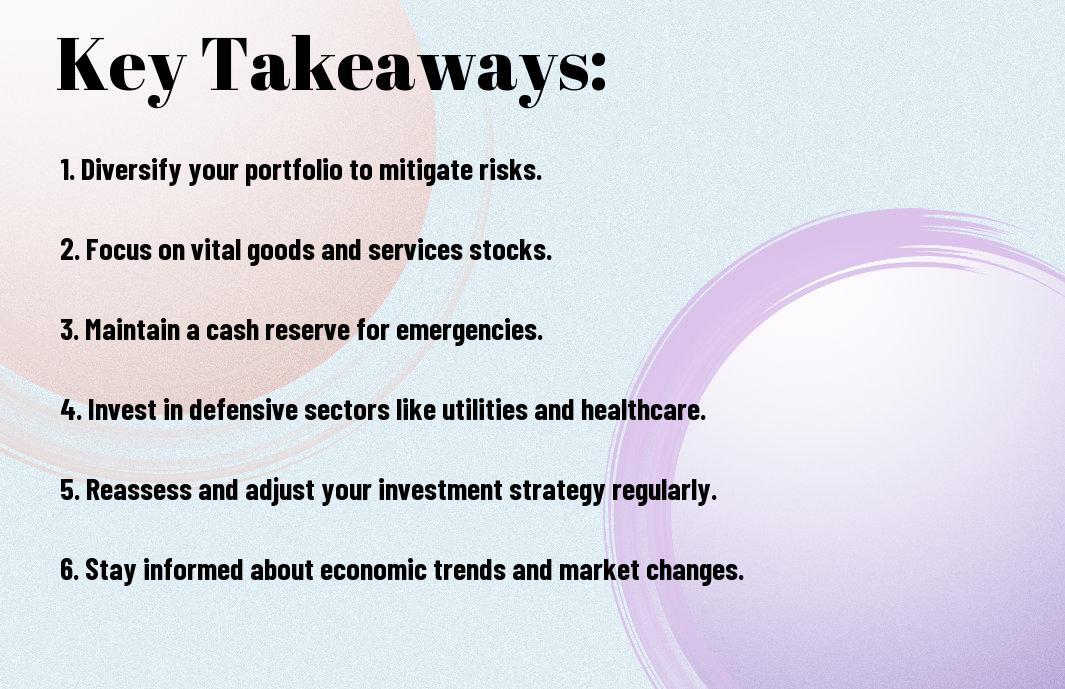Investments can be particularly vulnerable during a recession, making it crucial for you to adopt strategies that safeguard your financial future. Understanding market trends, diversifying your portfolio, and exploring defensive assets are key steps you can take to mitigate risks. In this guide, you will learn effective techniques to help you maintain your investment value even in challenging economic times. By employing a proactive approach, you can navigate the uncertainties of a recession with confidence.
Key Takeaways:
- Diversification is necessary: Spread your investments across different asset classes to minimize risk and reduce potential losses during economic downturns.
- Focus on quality: Invest in companies with strong fundamentals, stable earnings, and a solid history of performance, making them more resilient during tough times.
- Increase liquidity: Maintain a portion of your portfolio in cash or liquid assets to ensure you have the flexibility to seize opportunities when they arise.

Understanding Recessions
To effectively protect your investments during a recession, it is necessary to first understand what a recession entails. Recessions are periods of economic decline characterized by falling GDP, reduced consumer spending, and rising unemployment rates. These factors can significantly impact various sectors, influencing your investment strategy and decisions. Comprehending the dynamics of recessions can help you formulate a sound approach to safeguarding your financial assets.
Defining a Recession
Any economic downturn that lasts for two consecutive quarters, resulting in a contraction in economic activity, is classified as a recession. This phase typically sees demand for goods and services plummet, prompting businesses to scale back operations, cut jobs, and delay investments. Understanding this definition can aid you in assessing the overall economic climate and its implications for your portfolio.
Historical Impact on Investments
After the Great Depression, various recessions have shaped investment landscapes differently, often leading to significant market corrections. You may find that assets such as stocks and real estate often experience sharp declines during these times.
Impact analysis of past recessions reveals patterns and trends that can inform your investment strategies. Historically, equities tend to suffer losses, while some categories like bonds might perform better. Understanding these dynamics can help you navigate investment choices based on historical data. Moreover, many investors use a recession as an opportunity to buy undervalued assets when prices dip, creating potential for long-term gains once the economy rebounds. Knowing these insights can equip you to make more informed decisions for your financial future.
Assessing Your Current Investment Portfolio
Assuming you want to safeguard your financial future, it’s important to start by evaluating your current investment portfolio. Look at each asset’s performance, risk level, and how they might react in the event of an economic downturn. This article on 5 Ways to Bolster Your Finances in a Recession can provide additional insights into managing your finances during uncertain times.
Identifying Vulnerable Assets
Across your portfolio, certain assets may be more susceptible to economic shifts, such as those concentrated in cyclical industries or high-risk stocks. Identifying these vulnerable assets is necessary for making informed decisions to mitigate potential losses.
Diversification Strategies
Any good investor will tell you that diversification is key to managing risk. This means spreading your investments across different asset classes, sectors, and even geographical regions to reduce the impact of a downturn in any one area.
Diversification helps you build a more resilient portfolio. By allocating your resources into various investments—including stocks, bonds, real estate, and alternative assets—you can minimize exposure to any single economic event that may negatively affect your overall portfolio performance. Evaluating and adjusting your asset allocation in line with your risk tolerance and the potential economic outlook is a solid strategy for weathering recessions.

Defensive Investment Strategies
Many investors seek refuge during a recession by adopting defensive investment strategies. These approaches aim to minimize risk and protect your portfolio from market volatility. By focusing on stable assets and industries less sensitive to economic downturns, you can create a buffer against potential losses while still pursuing growth opportunities.
Safe Haven Assets
The appeal of safe haven assets lies in their ability to retain value during turbulent times. Gold, silver, and certain currencies are often seen as reliable options, providing a refuge for your capital when the stock market falters. By allocating a portion of your portfolio to these assets, you can safeguard against economic uncertainty.
Investing in Bonds
The bond market offers a stable alternative for your investments during a recession. Government and high-quality corporate bonds typically provide lower risk and consistent income, helping to balance your portfolio. As economic conditions fluctuate, bonds can deliver a reliable source of returns, often making them an attractive option for risk-averse investors.
It’s imperative to consider different types of bonds, such as U.S. Treasuries, municipal bonds, and investment-grade corporate bonds. Each carries varying levels of risk and potential returns, allowing you to tailor your investment strategy to fit your risk tolerance. Diversifying across different maturities and issuer types can also enhance your bond holdings’ stability, protecting your overall investment during uncertain economic times.
Sector Rotation During Recession
Your investment strategy should adapt to economic cycles, especially during a recession. One effective approach is sector rotation, which involves reallocating your portfolio to sectors expected to outperform during economic downturns. By identifying these sectors and adjusting your investments accordingly, you can mitigate losses and potentially capitalize on opportunities in a fluctuating market.
Industries that Perform Well
That during a recession, certain industries tend to remain resilient, such as consumer staples, healthcare, and utilities. These sectors provide necessary goods and services that maintain demand regardless of economic conditions, making them preferable options for your investment portfolio when uncertainty looms.
Adjusting Your Focus
Before making drastic changes to your portfolio, it’s necessary to analyze current market trends and assess which sectors may offer stability. By shifting your focus from high-risk investments to those historically deemed recession-proof, you can enhance your financial security during downturns.
This strategic adjustment allows you to navigate economic challenges effectively and maintain your investments’ value. Keeping an eye on market indicators can help you identify promising sectors and reallocate your resources. By concentrating on industries that provide critical services or products, you can bolster your portfolio against the impacts of recessionary pressures.
Utilizing Cash and Liquidity
Unlike other investments that may become illiquid during a recession, maintaining cash and liquidity provides you with the flexibility to navigate market uncertainty. Having readily accessible funds allows you to respond quickly to changing conditions, fulfilling immediate needs while positioning your investments for recovery when the market rebounds.
Importance of Cash Reserves
Below the surface, a strong cash reserve acts as your safety net during turbulent economic times. It empowers you to cover importants without resorting to selling investments at a loss, providing peace of mind while allowing you to wait for better market conditions.
Opportunities in Down Markets
To take advantage of market downturns, your cash reserves can be instrumental in acquiring undervalued assets. This strategy can significantly enhance your investment portfolio once the economy rebounds.
Cash serves as your opportunity fund in down markets. By strategically deploying your cash reserves during a recession, you can invest in undervalued stocks or properties that may have significant potential for growth once economic conditions improve. This approach not only helps diversify your portfolio but also positions you to capitalize on price recoveries, maximizing your long-term financial gains.
Seeking Professional Guidance
Despite the many resources available online, enlisting the help of a financial advisor can provide personalized strategies that align with your unique goals. Experts can assess your current portfolio and recommend adjustments to help safeguard your investments during a recession. They can also offer insights into market trends and identify opportunities that may suit your risk tolerance.
When to Consult an Advisor
Along your investment journey, it’s wise to consult an advisor when facing significant life changes, such as a job loss, retirement, or inheritance. These moments often prompt complicated financial decisions where professional guidance can help clarify your options. If you’re unsure about your investment strategy in a fluctuating market, reaching out for advice is a proactive step in securing your assets.
Questions to Ask
Around the time of your consultation, it’s important to prepare a list of questions that can help you gauge the advisor’s expertise and approach. Understanding their investment strategy, fee structure, and experience during economic downturns can provide clarity and foster a strong working relationship.
Seeking to make the most of your advisor meeting, inquire about their investment philosophy and track record in similar market conditions. Ask how they adapt strategies during economic uncertainty and what protective measures they recommend for your specific investments. It’s also necessary to discuss their fee structure to ensure transparency. Open dialogue will empower you to make informed decisions about your financial future.
Q: What steps can I take to safeguard my investments during a recession?
A: To protect your investments during a recession, consider diversifying your portfolio across different asset classes, such as stocks, bonds, and real estate. Focus on investing in companies with strong balance sheets and consistent cash flow, which are more likely to withstand economic downturns. Additionally, maintaining a cash reserve can provide liquidity for purchasing undervalued assets during market dips and help you navigate unexpected expenses.
Q: Should I change my investment strategy in anticipation of a recession?
A: It may be wise to reassess your investment strategy based on current economic conditions. Consider adopting a more defensive approach by investing in sectors known for stability during downturns, such as consumer staples, utilities, and healthcare. Evaluating your risk tolerance is vital; if you’re uncomfortable with high volatility, you might want to allocate more to fixed-income securities. However, it’s important not to make hasty decisions based purely on fear; maintaining a long-term perspective is key.
Q: How can I identify which investments are more resilient during a recession?
A: Look for companies with strong fundamentals, such as low debt levels, consistent profitability, and a robust competitive advantage. Stocks belonging to industries that typically perform well during economic downturns, like discount retailers and vital goods providers, can also offer safety. Evaluating historical performance during past recessions can provide insights into how specific investments may react in the current environment. Financial ratios, such as the price-to-earnings ratio and dividend yield, can help indicate the stability of investments as well.


